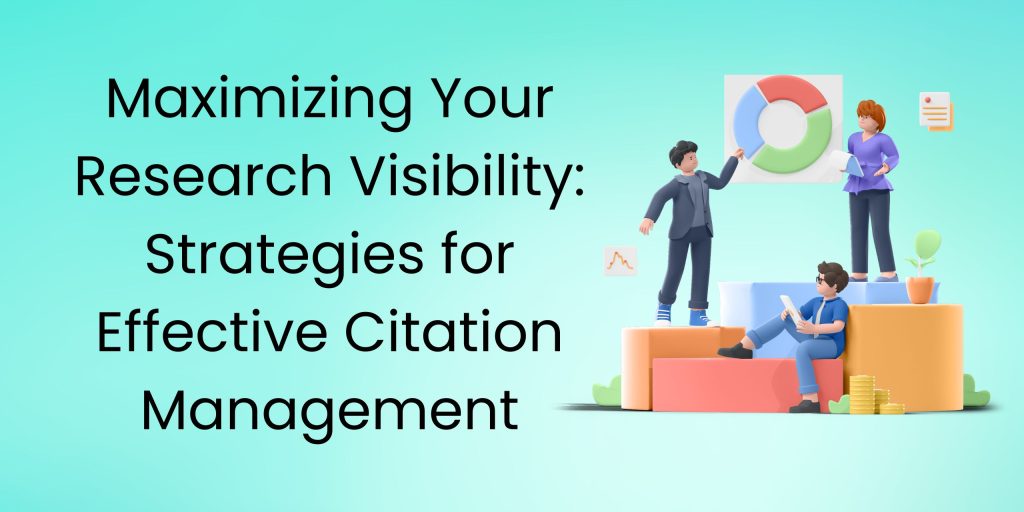Introduction:
In the realm of academic publishing, visibility is key. Researchers strive not only to produce high-quality work but also to ensure that it reaches the widest possible audience and has a lasting impact in their respective fields. One powerful way to increase research visibility is through effective citation management. By strategically managing citations, researchers can enhance the discoverability, credibility, and impact of their work. In this comprehensive guide, we’ll explore strategies for maximizing research visibility through effective citation management, offering insights, tips, and tools to help students elevate their scholarly profiles and reach broader audiences.
Understanding the Importance of Citation Management:
Citation management involves the systematic organization, tracking, and promotion of citations to one’s research outputs, including journal articles, conference papers, books, and other scholarly works. Effective citation management offers several benefits, including:
- Increased Discoverability: By ensuring that your research is properly cited in academic publications, databases, and citation indexes, you can enhance its visibility and accessibility to fellow researchers, practitioners, and policymakers.
- Enhanced Credibility: Citations serve as a measure of the impact and influence of your research within the academic community, contributing to your professional reputation and credibility as a scholar.
- Networking Opportunities: By tracking citations to your work, you can identify potential collaborators, mentors, or peers who share similar research interests and engage in productive academic exchanges.
- Funding and Career Advancement: A strong citation record can strengthen grant applications, tenure and promotion dossiers, and job applications, demonstrating the significance and impact of your research to funding agencies, hiring committees, and academic institutions.
Key Strategies for Effective Citation Management:
- Maintain an Updated Publication List: Create and regularly update a comprehensive list of your publications, including journal articles, conference papers, book chapters, and other scholarly outputs. Organize your publication list chronologically or thematically to facilitate easy reference and citation tracking.
- Use Persistent Identifiers: Assign persistent identifiers, such as Digital Object Identifiers (DOIs) or International Standard Book Numbers (ISBNs), to your publications to ensure their long-term accessibility and citability. Include these identifiers in your publication metadata to facilitate accurate citation and attribution by other researchers.
- Monitor Citations: Regularly monitor citations to your publications using academic databases, citation indexes, and citation tracking tools such as Google Scholar, Web of Science, or Scopus. Set up citation alerts to receive notifications whenever your work is cited by other researchers.
- Promote Open Access: Consider publishing your research in open access journals or depositing preprints in institutional repositories to maximize its accessibility and reach. Open access publications are more likely to be cited and disseminated widely, increasing the visibility and impact of your research.
- Collaborate and Network: Collaborate with colleagues, mentors, and peers in your research field to increase the visibility and impact of your work. Co-authorship and collaboration can amplify the reach of your research and attract citations from diverse audiences and disciplines.
- Engage with Social Media: Leverage social media platforms, academic networking sites, and scholarly communication channels to promote your research and engage with fellow researchers. Share links to your publications, conference presentations, and research findings on platforms such as Twitter, LinkedIn, ResearchGate, or Academia.edu to reach a broader audience and stimulate scholarly discussions.
- Enhance Metadata and Keywords: Optimize the metadata and keywords associated with your publications to improve their discoverability and search engine ranking. Include relevant keywords, subject headings, and descriptors in your publication titles, abstracts, and keywords fields to increase visibility in academic databases and search engines.
- Participate in Academic Events: Present your research at conferences, workshops, and seminars to showcase your work to peers, colleagues, and potential collaborators. Networking at academic events can lead to new citation opportunities and collaborations, increasing the visibility and impact of your research within the scholarly community.
Tools for Citation Management:
- Reference Management Software: Use reference management software tools such as Zotero, Mendeley, or EndNote to organize, annotate, and cite bibliographic references in your research papers. These tools facilitate citation management, citation formatting, and bibliography creation, saving time and ensuring accuracy in citation practices.
- Citation Tracking Tools: Utilize citation tracking tools such as Google Scholar, Web of Science, or Scopus to monitor citations to your publications and track citation metrics such as citation counts, h-index, and citation networks. These tools provide insights into the impact and visibility of your research within the academic community.
- Academic Social Networks: Join academic social networking platforms such as ResearchGate, Academia.edu, or Mendeley to connect with fellow researchers, share your publications, and track citations to your work. These platforms offer features such as citation alerts, profile analytics, and collaboration opportunities to enhance your citation management efforts.
Conclusion:
Effective citation management is essential for maximizing the visibility, impact, and reach of your research within the academic community and beyond. By adopting strategies such as maintaining updated publication lists, using persistent identifiers, monitoring citations, promoting open access, collaborating and networking, engaging with social media, and utilizing citation management tools, students can elevate their scholarly profiles, attract citations, and contribute to the advancement of knowledge in their respective fields. Remember, citation management is not just about counting citations; it’s about fostering collaboration, sharing knowledge, and making a meaningful impact through your research contributions. With diligence, persistence, and strategic planning, you can harness the power of citation management to enhance the visibility and impact of your research and advance your academic career.
